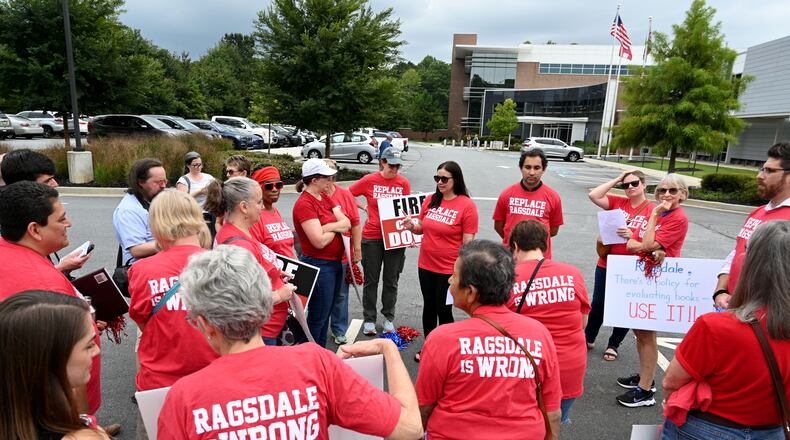Two Cobb County parents are suing the school district for keeping them from signing up for public comment at a meeting because of what they intended to say, they allege in a federal lawsuit filed Thursday.
The lawsuit centers on a September 2023 board of education meeting where district officials changed how people could sign up to address the board. People who intended to speak against some of the district’s recent actions had lined up for two hours to secure one of the limited speaker slots, the lawsuit complaint says. But at the last minute, district staffers changed the location of the sign-up, causing a scrum outside the district offices where people were shoved, police got involved and several people sustained minor injuries, according to media reports from the day. The two people who filed the suit were unable to speak at the meeting.
The district’s conduct is a freedom of speech violation, the lawsuit claims.
“I try to teach my kids that when something is not right to have the confidence to speak out,” plaintiff Melissa Marten said in a news release about the lawsuit. “What happened to me at that board meeting was wrong and I am setting the example for my children by filing this lawsuit.”
A spokesperson for the state’s second-largest school district said in an emailed statement that it does not comment on ongoing litigation, but added: “It’s disturbing that some choose to focus on wasting taxpayer dollars and attacking hard-working educators, parents and public employees to wage a political fight on the eve of an election.”
The September 2023 meeting in question was the first after Katie Rinderle, formerly an elementary teacher in Cobb, was fired for reading a book that challenges gender norms to fifth grade students. It also was shortly after the district removed the first of several books it has called “sexually explicit.” Dissenters organized a “Replace Ragsdale” rally, gathering in the parking lot before the meeting wearing red T-shirts and holding signs calling for the removal of Superintendent Chris Ragsdale. They intended to speak during the public comment portion of the school board meeting that evening.
Cobb County allows only 15 people to speak during each public comment session. Participants are required to sign up in-person. Sign-up begins 30 minutes before a meeting starts and closes 10 minutes before the start of the meeting.
Before this meeting, commenters typically signed up on an iPad in the lobby of the Cobb school district office, where the meetings take place. At the September 2023 meeting, several people from the anti-Ragsdale rally formed a line in the lobby at the usual location.
In the past year, a group called the Cobb Community Care Coalition filed public records requests to obtain messages between district officials on that day. Cited in the lawsuit, the messages appear to show discussions about “bad guys,” or people speaking against Ragsdale, and wanting to have counter-protesters there. They also mentioned wanting to change the sign-up process.
“We moved the sign-in computer from the narrow entrance to the Board room to allow the large crowd easy access,” district spokesperson Nan Kiel said in an emailed statement to The Atlanta Journal-Constitution in September 2023.
Marten and Jenny Peterson were among those who waited in line but were not able to get a speaking spot when the sign-up moved. The lawsuit names two speakers who were not in the original line but were able to speak in favor of Ragsdale after the sign-up location was moved.
The parents are asking the court to prevent the district from trying to keep critics from signing up to speak at board meetings. Craig Goodmark, the attorney who represented Rinderle in her termination hearing, and Gerald Weber are representing Marten and Peterson.
In an interview with the AJC last year, Joy Ramsingh, an attorney and board member at the Georgia First Amendment Foundation, said whether the district truly was attempting to restrict viewpoints at the September 2023 meeting comes down to intent. “But even if that intent would not be provable in a court of law, it certainly is not going to improve their standing in a court of public opinion,” she said.
About the Author






